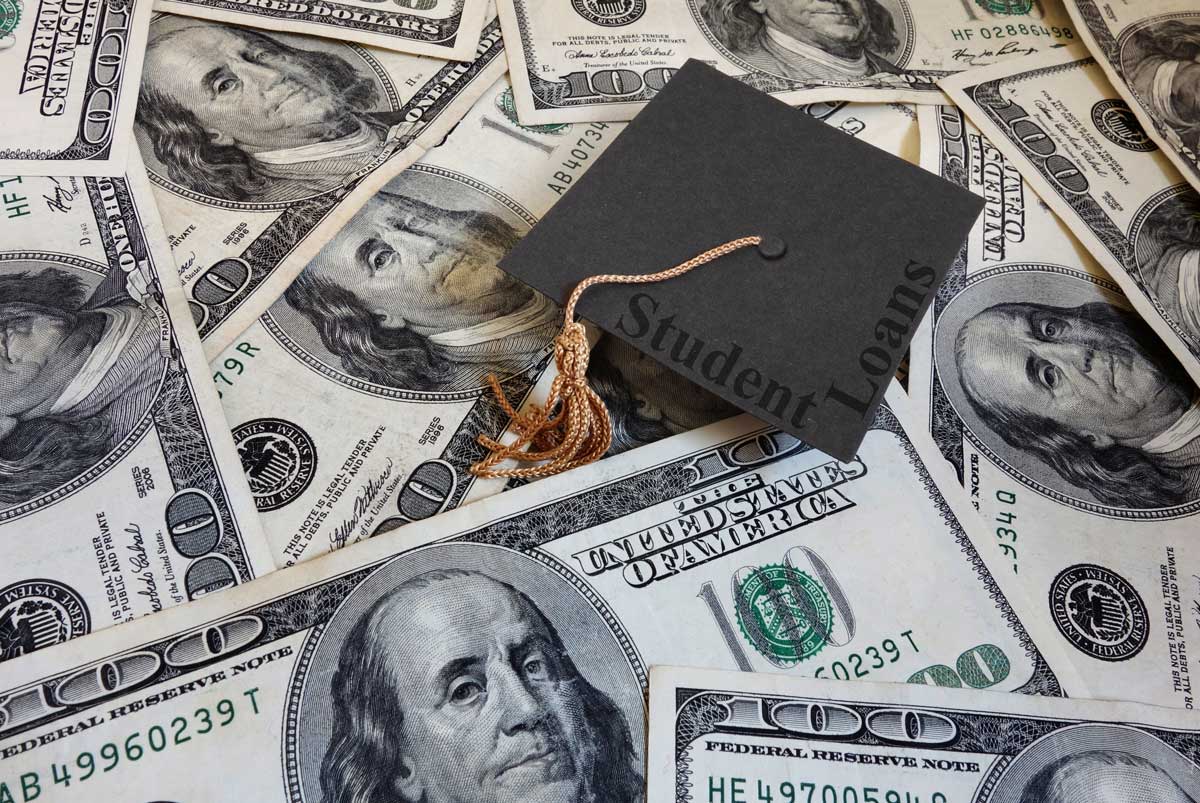Yesterday, the White House announced a final Covid-19 related extension of the suspension of student loan repayments through December 31, 2022 as well as the long-awaited campaign promise of President Biden to cancel $10,000 in student loans. The administration also provided additional expansion of the federal student loan cancellation program.
I have many thoughts, most of them mixed. I earned my bachelor’s and master’s degree by utilizing the federal student aid program along with scholarships and grants from the institutions (Duke University and Tulane University) that I attended. I received a Basic Educational Opportunity Grant (BEOG) when the program began in my sophomore year at Duke. The BEOG is the program that was later renamed for Sen. Claiborne Pell in recognition of his work with grant legislation. It’s my recollection that the National Defense Student Loans that I received were issued with a three percent interest accrual that began six months after I graduated from college. Because I went to graduate school immediately after undergrad, repayment of my undergrad loans was deferred while I was in school at Tulane. I repaid all my student loans about a year or two before they were due, but there were financial and social sacrifices made along the way to ensure that my loans were repaid. ISSUE 1: What do taxpayers and voters who repaid their college loans think about this loan forgiveness?
My next thought deals with choices that people make and have made about the college that they attended. I attended Duke University because, thanks to academic scholarships and financial aid, it was the best college that I could afford. Part of my financial aid package included Work-Study, a program that required me to work a specific number of hours each semester for which I was paid. It wasn’t a grant. If I didn’t work, I didn’t get the money. My earnings were used for textbooks and other expenses. I went to Tulane’s business school for an MBA because they awarded me a fellowship that covered my tuition. I borrowed money to cover my room and board expenses.
My three younger siblings went to in-state public universities (University of Maryland, Baltimore County, University of Maryland, Baltimore, Towson University) and essentially covered all their college tuition and expenses through their summer and school year jobs with some help from my parents. They did not want to borrow money, and they worked year-round to do so. My parents worked hard to support their three children who attended college over an eight consecutive years period. I don’t recall any family vacations during that period, but all of us were working to save money for next year’s college expenses so it’s not likely we would have taken one.
My family is not the only family that I know that made choices about where they would attend college to reduce their borrowing or eliminate it. We also weren’t the only ones who worked multiple jobs to pay for expenses at the time they were incurred instead of borrowing. I had classmates and friends from high school who signed up for ROTC to pay for college during a period when the draft was winding down but servicemembers were still being sent to Vietnam. A good friend of mine at Duke transferred to the University of Florida when her father lost his job and couldn’t pay Duke’s tuition. She worked three jobs to avoid borrowing money. My wife attended American University’s Washington School of Law because it provided her with more grants (and less loans) than the Ivy League law school where she was accepted but couldn’t afford to attend. ISSUE 2: What do people who made choices like the ones I mention above think about this loan forgiveness?
When I led the American Public University System (APUS), we deliberately kept our tuition low to minimize the loans that anyone had to take. From October of 2001 through the date I retired in August 2020, undergraduate active duty servicemembers had no out-of-pocket costs for tuition because we held our tuition for them at Department of Defense (DoD) reimbursement levels and no out of pocket costs for textbooks because we provided them through a grant program. Over time, we eliminated almost all other fees. Our tuition was well below the federal loan caps and unlike many institutions, we chose not to increase tuition because student loans would cover it. ISSUE 3: What do institutions that managed their costs tightly to keep tuition below student loan caps think about the more expensive institutions indirectly receiving this bailout?
My understanding is that loans that are eligible for the student loan forgiveness are all loans disbursed before 7/1/2022? ISSUE 4: Wouldn’t you think everyone in the freshman class starting this fall would expect a similar forgiveness at some point? As my grandfather would sometimes say, “that train has left the station.”
My understanding is that Parent PLUS loans are eligible for loan forgiveness. The announcement states that all individuals earning less than $125,000 or whose income as a couple is less than $250,000 are eligible for $10,000 in loan forgiveness unless they received a Pell Grant which would entitle them to $20,000 in loan forgiveness. The ParentPLUS loan program is an obligation of their parent/grandparent/relative if the student does not repay it. Is this an additional forgiveness or does it count against the individual’s $10,000 or $20,000 limit? By the way, I have never been a fan of the ParentPLUS loan program. I believe it is designed to support the lavish cost spending of colleges that charge much more than their funded scholarships and grants combined with financial aid will support. I have thought for years that this specific loan program should be abolished to force colleges to lower their tuition and not require parents to borrow money. I am sure there are exceptions to every story, but this one is where I read the horror stories about students attending institutions and whose grandmother agreed to sign for $100,000 in ParentPLUS loans that neither the student nor grandmother can repay.
I assume that If ParentPLUS loans are eligible for forgiveness that GradPLUS loans are as well. My opinion about GradPLUS loans is similar to ParentPLUS loans. The virtually unlimited borrowing amount under these programs has contributed to extremely high graduate school tuitions as well as more enrollments than there are jobs for graduates (English PhD’s are an example I have often seen cited). GradPLUS loans are obligations of the student, however, so I don’t recommend eliminating the program. However, I believe it should have reasonable loan caps. ISSUE 5: If the Federal Student Aid programs are broken, when does the Biden administration plan to work with Congress to change them? Right now, there is little accountability for non-profit colleges and universities to manage their expenses to reduce the amount of money that students must pay for an education.
Another announcement was a reminder to anyone who works for “non-profits, the military, or federal, state, Tribal, or local government may be eligible to have all of their student loans forgiven through the Public Service Loan Forgiveness (PSLF) program.” This is another example of railroading a temporary policy change (it expires on 10/31/2022) without broader and transparent discussion. When this legislation was enacted, I believe Congress was thinking about people who served in the Peace Corps as employees of non-profits who were not highly paid. Some of our most recognizable non-profits make a lot of money like the NFL, the PGA, the Red Cross. Why should highly paid employees of non-profits and the government get loan forgiveness when lower paid employees of for-profit corporations are ineligible for loan forgiveness? This income assumption also doesn’t consider government employees who retire at a fairly young age after 20 years of service, are eligible for a pension and then work outside of government and earn more money and another pension. ISSUE 6: Make Public Service Loan Forgiveness subject to income limitations and only allow it for a specific list of non-profits.
Another announcement was made regarding reducing future loan payments to no more than 5% of discretionary income monthly on undergraduate loans. The amount of income that is considered non-discretionary will be raised as well guaranteeing that no borrower earning under $15/hour will have to make a monthly payment. This just adds to the principal of the loan which is one of the common complaints now. However, the administration proposes to cover that interest if the required payment is $0. In addition, the Biden administration has a major solution for all borrowers, forgive whatever hasn’t been repaid after 10 years instead of 20 years. ISSUE 7: These may be great ideas but appear to me to go beyond what the Executive branch of the federal government is entitled to do. Will they survive legal challenges?
I didn’t see any mention of the Internal Revenue Service and waiving their regulations about reporting debt forgiveness as income. Maybe there’s a law already on the books that covers this. ISSUE 8: Is there an income tax waiver for loan forgiveness?
I am sure that my issues are just the tip of the iceberg, and when I read other critiques, I’ll follow up with another list. My last issue relates to students who enrolled at a college or university for a single semester, never completed their courses and earned a grade, and borrowed more money than the cost of tuition enabling them to walk away with several thousand dollars with no intention to ever repay it. There was a four-or-five-year period from 2010 through 2015 where those students were identified as “Pell runners.” I don’t believe that the Department of Education ever deleted those loans from its rolls unless there was a fraud conviction. Now, those people are going to get away with no financial obligation to return the excess funds. ISSUE 9: Why should we forgive loans for students who dropped out before completing a single semester and never earned a grade (unless they have a legitimate reason)? I wonder how many of the loans being forgiven fall in this category. I bet the Department of Education knows.
Why didn’t the Biden Administration have an open discussion of these proposed changes just like they do when they have hearings about proposed regulations. Those hearings have industry and student representatives and occur in a public setting where people can attend and later comment on the proposed regulations. There were no open hearings in this situation. I have a feeling that there will be lawsuits. Had there been open hearings where consensus was reached on how to enact some of these changes, I would be more in favor of them.
I am a believer in providing an affordable college education to everyone who wants one. That solution should utilize student loans as a component but provide some safeguards to prevent overborrowing. I also believe that we shouldn’t use the student loan program to prop up failing institutions or to pad the pockets and endowments of the wealthiest institutions. It’s time for a change but it appears that these choices were solely politically motivated. Whether these proposed changes will survive legal challenges will likely occur after the November elections, so this announcement could be viewed as shrewd or devious, depending on your perspective. Regardless of your perspective, none of these changes will reduce the current costs of college. That should be the objective that all of us could support.











